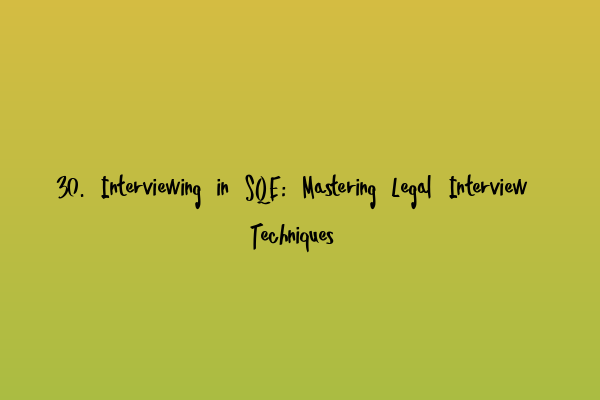Interviewing in SQE: Mastering Legal Interview Techniques
As you prepare for the SQE exams and embark on your journey to become a qualified solicitor, it’s important to not only excel in the theoretical aspects of law but also develop practical skills that will set you apart from the competition. One such skill that is crucial for success in the legal profession is the art of interviewing. Whether you are interviewing clients, witnesses, or even potential employers, having strong interview techniques can make all the difference in building relationships, gathering information, and making informed decisions.
The Purpose of Interviews
Before delving into the strategies and techniques for effective legal interviews, it’s important to understand the purpose behind them. Interviews serve several purposes in the legal field:
- Obtaining information: Interviews are a valuable tool for gathering information from clients, witnesses, or any other relevant parties involved in a legal matter. The information obtained can be crucial in building a strong case or providing appropriate advice to clients.
- Evaluating credibility: Through interviews, lawyers can assess the credibility of witnesses or potential employees. By asking targeted questions and observing verbal and non-verbal cues, it becomes easier to evaluate the reliability and truthfulness of the information provided.
- Establishing rapport: Building rapport with clients and colleagues is essential for effective communication and collaboration. Interviews provide an opportunity to establish trust and develop a connection that can positively impact the success of legal matters.
Preparing for an Interview
Proper preparation is key to succeeding in any interview. Here are some essential steps to take when preparing for a legal interview:
- Research the subject matter: Familiarize yourself with the legal issues involved in the matter at hand. Conduct thorough research and stay up-to-date with any recent developments or precedents relevant to the case.
- Anticipate questions: Put yourself in the shoes of the interviewer and anticipate what questions they may ask. Prepare thoughtful and well-reasoned responses to demonstrate your knowledge and expertise.
- Prepare documents and evidence: If applicable, gather and organize any documents or evidence relevant to the interview. This will not only make you appear well-prepared but also enable you to reference and present information effectively.
- Practice active listening: Interviewing is not just about asking questions; it’s about actively listening to the responses. Practice active listening techniques such as paraphrasing and summarizing to ensure you understand and process the information being provided.
For a comprehensive guide on preparing for the SQE exams, consider enrolling in SQE 1 Preparation Courses and SQE 2 Preparation Courses to enhance your knowledge and skills.
Effective Interview Techniques
Now that you understand the importance of interviews and have prepared adequately, it’s time to master some effective interview techniques:
- Establish rapport: Begin the interview by establishing a positive and comfortable atmosphere. Use small talk to build rapport and put the interviewee at ease. This will facilitate open and honest communication.
- Ask open-ended questions: Open-ended questions encourage the interviewee to provide detailed and thoughtful responses. These questions typically begin with “how,” “why,” or “tell me about.” They allow for a deeper understanding of the interviewee’s perspective and experiences.
- Active listening: As mentioned earlier, active listening is a vital component of effective interviewing. Pay careful attention to both verbal and non-verbal cues, and demonstrate your attentiveness by nodding, maintaining eye contact, and taking notes.
- Clarify and probe: If something is unclear or you need more information, don’t hesitate to ask follow-up questions. Clarifying and probing further allows for a more comprehensive understanding of the subject matter.
- Avoid leading or biased questions: Be mindful of how you phrase your questions to avoid leading or biased responses. Instead, aim for neutral and objective inquiries that allow the interviewee to provide their perspective without influence.
Conclusion
Mastering legal interview techniques is essential for success in the legal field. By understanding the purpose of interviews, properly preparing, and implementing effective techniques, you can enhance your interviewing skills and build stronger relationships with clients, witnesses, and potential employers.
If you’re looking to further enhance your legal knowledge and skills, consider exploring SQE 1 Practice Exam Questions and SQE 1 Practice Mocks FLK1 FLK2 to test your understanding and identify areas for improvement.
Stay updated with the latest SRA SQE Exam Dates and continue honing your legal skills to excel in your SQE exams and beyond.
